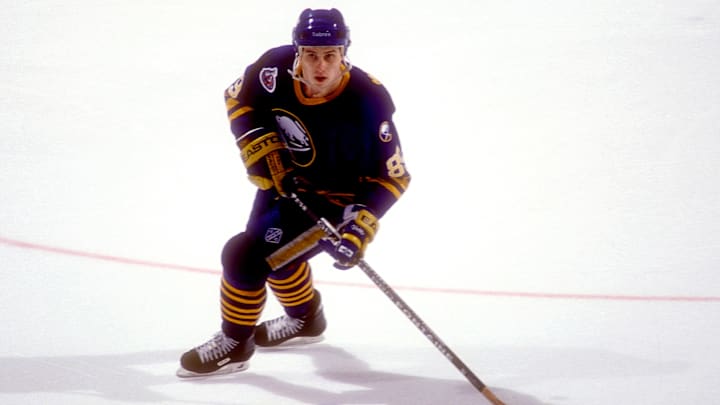As part of an incredibly hectic week in hockey, the Hockey Hall of Fame announced its 2024 class on Tuesday, with Pavel Datsyuk, Jeremy Roenick, and Shea Weber highlighting this year's inductees. However, as is often the case, the focus turned to those who didn't get inducted. Year after year, Alexander Mogilny and Rod Brind'Amour are mentioned as the two players who are continually overlooked for this honor. Supporters of those players and the teams they played for have been vocal about their exclusion for many years now, to no avail.
Alexander Mogilny and Rod Brind'Amour's resumes speak for themselves
Despite dealing with many injuries throughout his career, Alexander Mogilny recorded 1,032 points in fewer than 1,000 games over his 16-year career with Buffalo, Vancouver, New Jersey, and Toronto. The peak of his career came during the 1992-93 season when he tied Teemu Selanne for the league lead in goals with 76. While he wouldn't reach those heights again, Mogilny would be a point-per-game player in eight of his 16 seasons. Mogilny would win a Stanley Cup in 2000 with New Jersey and the Lady Byng in 2003 with Toronto.
Rod Brind'Amour never recorded a 100-point season during his 20-year career, but he still managed to record nearly 1,200 points in 1,484 games. Most of his career was spent with Philadelphia and Carolina after being drafted by the Blues. He eventually became the captain of the Hurricanes, leading them to a Stanley Cup victory in 2006. The 2004 lockout seemed to do him some good because, along with winning the Stanley Cup, he won the Selke in 2006 and 2007. Most importantly, Brind'Amour was the epitome of a pro, turning his excellent on-ice career into an outstanding coaching career.
Of the three male inductees this season, Pavel Datsyuk is the only player that felt like a surefire selection. I think there is a legitimate case for both Brind'Amour and Mogilny to have made it over either Jeremy Roenick or Shea Weber. Roenick had a fantastic career, scoring 513 goals (42nd all-time) and 1,216 points (47th). Weber was one of the most dynamic and exciting defensemen of the modern era, scoring the sixth-most points among all defensemen in the league during his 16 seasons.
I have no qualms with Roenick and Weber making it to the Hockey Hall of Fame, but there's no denying that Mogilny and Brind'Amour have both the individual accolades and team success that the other two lack. Roenick had two Top 10 finishes for the Hart and a third-place finish for the Calder but never got to hoist the Stanley Cup. Weber finished in the Top 10 of the Norris voting for nine straight seasons, including back-to-back runner-up finishes in 2011 and 2012, and he also failed to capture Lord Stanley, falling short in 2021 with Montreal. Weber also isn't technically retired yet, still having two years left on his contract with Utah.
Even acknowledging that the Hockey Hall of Fame doesn't only take NHL careers into account, both Mogilny and Brind'Amour have international success to boast. Mogilny is a member of the Triple Gold Club representing Russia, winning a World Juniors, Olympic, and World Championship gold during his career. Brind'Amour won a World Championship with Canada in 1994, scoring their only regulation goal in the Gold Medal Game before Canada won it in a shootout. Weber is the only player with more international hardware, and Roenick never won gold with the United States.
Placing a cap on the number of inductees makes no sense
One thing that has seemed to get lost during these discussions is the unnecessary limit that the Selection Committee places on each class. No more than four male players can be inducted at a time. While hockey, like most other institutions, does have a minimum percentage of the electorate that needs to approve an inductee, no one else limits the number of people who can be in a class.
It's also hard to ignore that, despite the limit of four players, the committee opted to induct only three this year, leaving Brind'Amour and Mogilny out with one spot remaining. I have a hard time believing the committee is going to change their minds if they willingly kept them out this year without meeting their quota. I've seen some go as far as to speculate that Brind'Amour might have to wait to get in as a coach instead of a player.
Regardless, I'm holding out hope that we'll see both players inducted in the near future. There are plenty of other players who also failed to get in this year that are more than deserving, like Henrik Zetterberg and Curtis Joseph. They'll have stiff competition next season, with Joe Thornton, Carey Price, Zdeno Chara, and more eligible for the first time. Only time will tell if these two outstanding players will get the honor they rightfully deserve.
